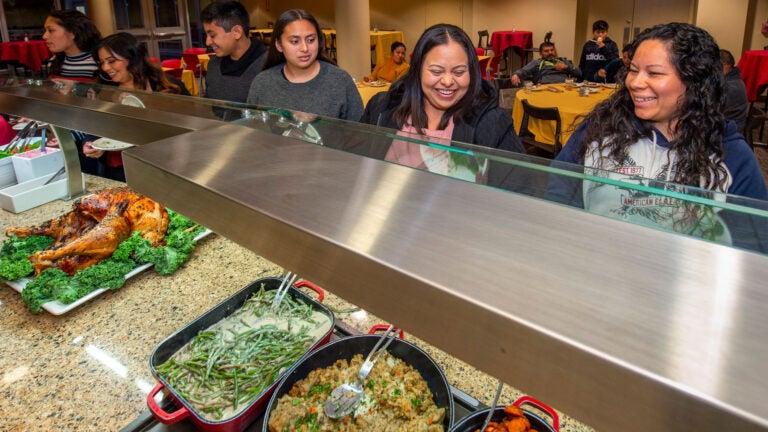
Luz Vasquez (second from right) with her children Emily Ramirez, Joseph Ramirez and Stephanie Vasquez (from right, behind Luz), join other NAI families at a holiday celebration. (USC Photo/Gus Ruelas)
Local working families enjoy a holiday meal, thanks to Neighborhood Academic Initiative
To show their appreciation for families in the nearby community, the USC Leslie and William McMorrow Neighborhood Academic Initiative partnered with USC Hospitality to provide a warm holiday dinner.
The holidays, while joyous, can be a difficult time for many, as working families with time and budget commitments are often put under additional strain. That’s why the USC Leslie and William McMorrow Neighborhood Academic Initiative partnered with USC Hospitality to provide a holiday meal for local families, many of which are hard-working people caught in the financial crunch of living in an expensive area.
“We wanted to provide a great meal to members of our local community,” said Carlos Perez of USC Hospitality. “The dinner provided is more of an appreciation. These are working families, and the goal was to create a setting that was welcoming and provides a break for one evening.”
One of the attendees was Luz Vasquez, a USC NAI parent who has dedicated herself to providing a better opportunity for her four children and values the guidance the program provides.
“I like to be involved in our kids’ education,” she said. “It’s important and it helps them succeed.” Vasquez has seen two of her daughters complete the seven-year program and proceed to college, with another daughter set to graduate high school in 2020.
NAI takes care of its students beyond the seven years you are in the program.
Stephanie Vasquez
The warm meal provided a welcome respite for the family. “This is really nice, to be able to come and have dinner with my kids without having to spend the day cooking,” Vasquez said. “Unfortunately, my husband couldn’t come because he has to work in order for us to make ends meet.”
Her daughter Stephanie Vasquez, a senior at USC, shared her challenges with food insecurity: “It was really difficult when I first started here. I was used to my mom’s cooking, so I wasn’t used to the food. Also, I wasn’t used to the dining hall times and I would miss out because I was too busy studying. I skipped meals because going out for food wasn’t an option.”
Food insecurity is a major challenge that many first-generation college students face. The rise of accessible food pantries is a great start and can take some pressure off students struggling to juggle their course work, employment and commitments to make financial contributions to the family household.
Vasquez credits such programs with getting her through some rough patches at USC. “NAI has La Tiendita, which is a store where you can get feminine hygiene products and other things that you need to get by,” she said. “NAI takes care of its students beyond the seven years you are in the program.”



